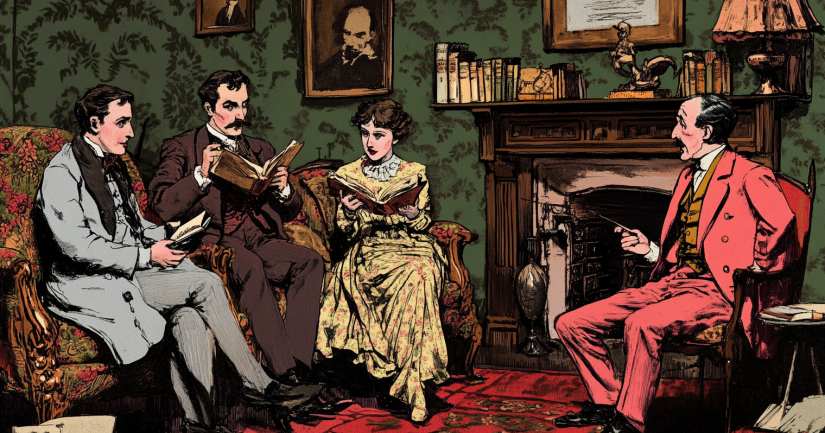
Double lives, societal satire, and delightfully sharp dialogue this The Importance Of Being Earnest Full Book Quiz challenges your knowledge of Oscar Wilde’s most enduring comedy from start to finish. Whether you’ve read the play once or memorized every epigram, this quiz invites you to dive deep into the story’s structure, character arcs, literary techniques, and famously absurd plot twists. From Act 1’s cigarette case confusion to the final curtain fall with a handbag in tow, this quiz covers every detail that makes Wilde’s masterpiece so beloved, layered, and bitingly brilliant.
Wilde described The Importance of Being Earnest as “a trivial comedy for serious people,” and he meant it. Beneath the play’s sparkling wit lies a razor-sharp critique of Victorian values, exposing hypocrisy, privilege, and identity with impeccable style. This quiz is your chance to explore all of that and more character motivations, dramatic devices, major events, and the meanings behind Wilde’s cleverest lines. If you’re ready to go beyond cucumber sandwiches and dive into the depth of Wilde’s satire, this quiz is for you.
You’ve explored the wit and satire of Oscar Wilde’s masterpiece, but there’s more to uncover! If you want to break it down act by act, start with The Importance Of Being Earnest Act 1 Quiz. Brush up on the play’s literary techniques with The Importance Of Being Earnest Drama Terms Quiz. Or, if you’re up for a quick challenge, test your knowledge with the The Importance Of Being Earnest True Or False Quiz!
Ready to Test Yourself? Start the The Importance Of Being Earnest Full Book Quiz
What This Full Book Quiz Covers
This quiz offers a comprehensive examination of all three acts, with questions drawn from:
- Major plot points, including the dual identities of Ernest and Bunbury
- Character analysis, exploring motivations, contradictions, and development
- Key scenes, from Gwendolen and Cecily’s tea showdown to Jack’s climactic discovery
- Important quotations, including who said them and what they reveal
- Themes and satire, including marriage, honesty, class, and gender roles
- Literary devices, like dramatic irony, paradox, and epigram
- Symbolism and structure, such as the role of setting, props (like the diary and handbag), and names
You’ll encounter multiple question types—character matchups, quote attributions, sequence of events, and thematic interpretations—to ensure a rich, challenging experience.
Key Elements You’ll Need to Remember
To ace this quiz, you’ll want to be familiar with:
- Jack’s true identity and how it’s revealed
- The meaning of “Bunburying” and who uses it
- The real and invented relationships among Jack, Algernon, Cecily, and Gwendolen
- Lady Bracknell’s role as both obstacle and comic relief
- Miss Prism’s mistake that set the entire plot in motion
- Algernon’s impromptu arrival in the country and how it complicates the plot
- Gwendolen and Cecily’s shared obsession with the name “Ernest”
- The recurring theme of double lives and moral contradiction
This quiz will also assess your ability to trace the emotional and satirical arcs from Act 1 through Act 3.
Fun Facts to Boost Your Wilde Knowledge
- Oscar Wilde wrote the entire play in just three weeks, but it remains his most famous work
- The first production in 1895 was interrupted by Wilde’s arrest and scandal, despite its popularity
- “Earnest” is a pun on both the name and the virtue highlighting the absurdity of social expectations
- Wilde’s mother used to write under a pseudonym and supported Wilde’s interest in language and performance
- The play’s original four-act version included scenes cut for pacing—tightening it into the fast-moving comedy we know today
- Wilde reportedly said the play had “no shred of real life in it,” despite it being one of his sharpest commentaries on society
Who Should Take This Quiz
This quiz is perfect for:
- Students preparing for exams, essays, or close reading discussions
- Theatre lovers who want to test their script knowledge and scene recall
- Wilde enthusiasts looking to refresh their understanding of key themes
- Teachers building assessments or class discussion materials
- Casual readers ready to move from spectator to literary sleuth
Whether you’re an expert or an eager newcomer, this quiz offers insight and engagement in equal measure.
Master Wilde’s Wit From Beginning to End
Every line of The Importance of Being Earnest is crafted for maximum impact, whether for laughter, irony, or reflection. This Full Book Quiz celebrates that brilliance by inviting you to explore the full play as a cohesive, satirical, and stylistic work of art.
Take the quiz now and see if you’ve truly mastered Wilde’s world where nothing is as earnest as it seems.
The Importance of Being Earnest Quizzes – Are you as witty as Wilde?
The Importance Of Being Earnes Book – FAQ
The Importance of Being Earnest is a play by Oscar Wilde, first performed in 1895. It is a comedic exploration of social conventions and the absurdities of Victorian society, often celebrated for its witty dialogue and clever plot twists.
The central characters are Jack Worthing and Algernon Moncrieff, both of whom lead double lives. Other significant characters include Gwendolen Fairfax, Cecily Cardew, Lady Bracknell, and Miss Prism. Each character contributes uniquely to the unfolding comedy and satire.
The play delves into themes such as identity, the nature of truth, and the triviality of societal norms. Wilde uses satire to critique the superficial values of the Victorian upper class, highlighting the contrast between appearances and reality.
This play is revered for its sharp wit and enduring social commentary. Wilde’s masterful use of language and humor has allowed it to remain relevant and engaging for audiences over a century after its debut. Its clever critique of societal norms continues to resonate today.
Wilde employs humor through puns, paradoxes, and irony to both entertain and provoke thought. His clever dialogue and situations expose the absurdities of social pretensions, encouraging audiences to reflect on the sometimes arbitrary nature of societal expectations.
